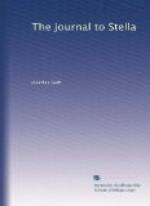5 One of them was by Oldmixon: Reflections on Dr. Swift’s Letter to the Earl of Oxford.
6 Beg your pardon.
7 See Letter 25, note 9.
8 On May 28, Lord Halifax moved an Address to the Queen that the instructions given to the Duke of Ormond might be laid before the House, and that further orders might be issued to him to act offensively, in concert with the Allies. Wharton and Nottingham supported the motion, but it was negatived by 68 votes against 40. A similar motion in the House of Commons was defeated by 203 against 73.
9 See Letter 34, note 10.
10 See Letter 23, note 13.
11 “Some Reasons to prove that no Person is obliged by his Principles, as a Whig, to oppose Her Majesty: in a Letter to a Whig Lord.”
12 Several words obliterated.
13 Several words obliterated.
14 The bellman.
15 This present writing.
16 Please.
Letter 48.
1 Addressed to “Mrs. Rebecca Dingley,” etc. Endorsed “June 23d.”
2 Mr. Ryland reads “second.”
3 As I hope to be saved.
4 See Letter 30, Sept. 18, 1711.
5 Glad at heart.
6 The threepenny pamphlet mentioned in Letter 47, note 11.
7 I.e., for.
Letter 49.
1 Addressed to “Mrs. Dingley.” Endorsed “July 8.”
2 See Letter 28, note 24.
3 See Letter 10, note 2.
4 See Letter 3, note 11.
5 See Letter 48, note 4.
6 Dr. William Lloyd—one of the Seven Bishops of 1688—was eighty-four years of age at this time; he died five years later. He was a strong antipapist, and a great student of the Apocalypse, besides being a hard-working bishop. A curious letter from him to Lord Oxford about a coming war of religion is given in the Welbeck Papers (Hist. MSS. Comm.) v. 128.
7 “Toland’s Invitation to Dismal to dine with the Calf’s Head Club.” The Earl of Nottingham (Dismal) had deserted the Tories, and Swift’s imitation of Horace (Epist. I. v.) is an invitation from Toland to dine with “his trusty friends” in celebration of the execution of Charles I. The Calf’s Head Club was in the habit of toasting “confusion to the race of kings.”
8 Bolingbroke.
9 George Fitzroy, Duke of Northumberland (died 1716), a natural son of Charles ii., was also Viscount Falmouth and Baron of Pontefract. See Notes and Queries, viii. i. 135.
10 Enoch Sterne.
11 Templeoag (see Letter 48, Jun. 17, 1712).
12 Swift probably was only repeating an inaccurate rumour, for there is no evidence that Steele was arrested. His gambling scheme was withdrawn directly an information was laid under the new Act of Parliament against gambling (Aitken’s Life of Steele, i. 347).




